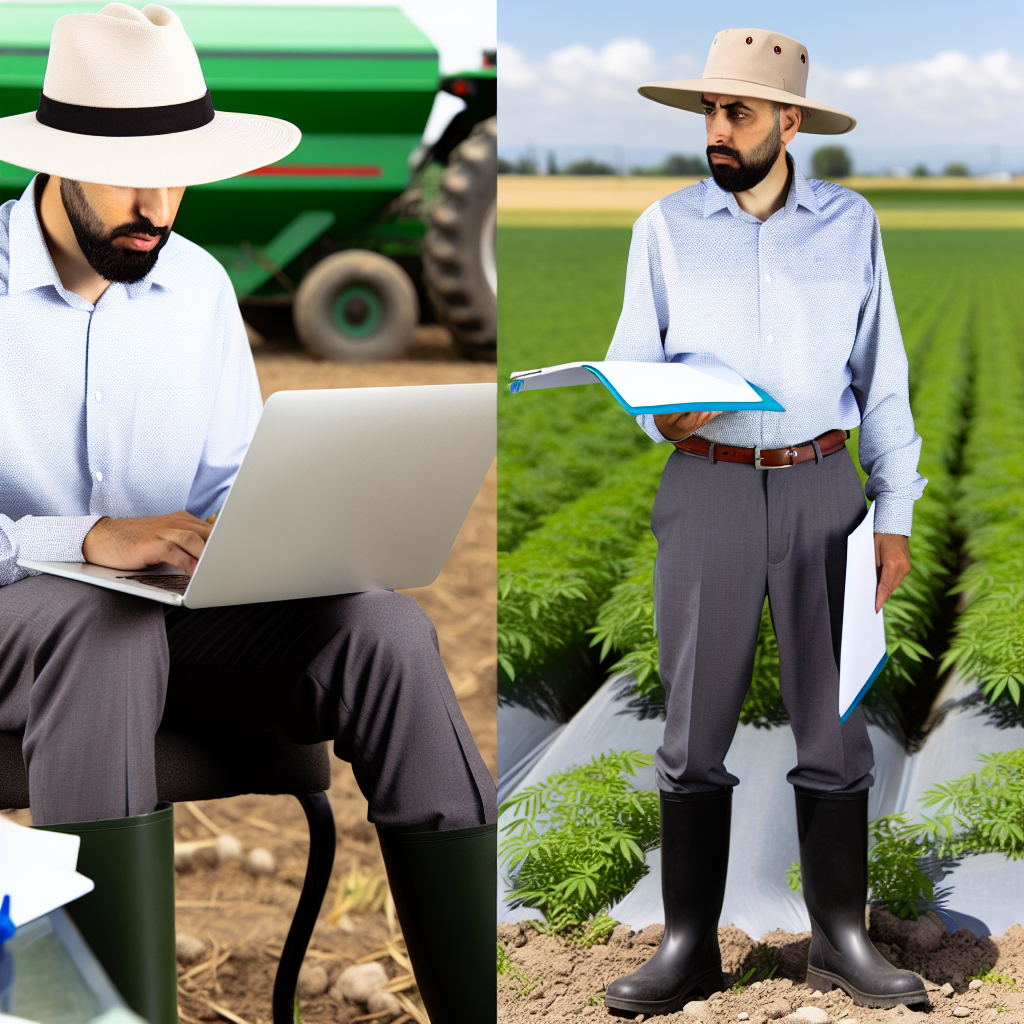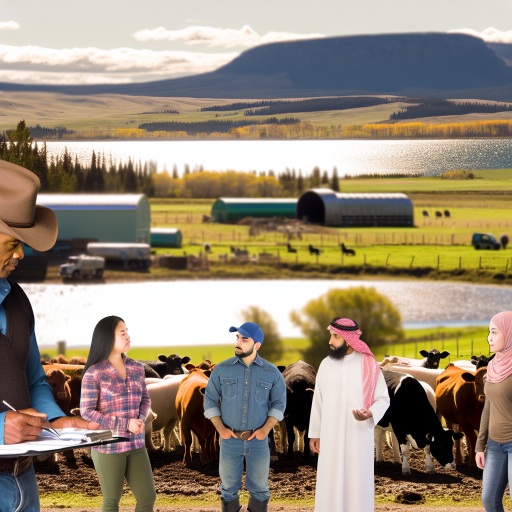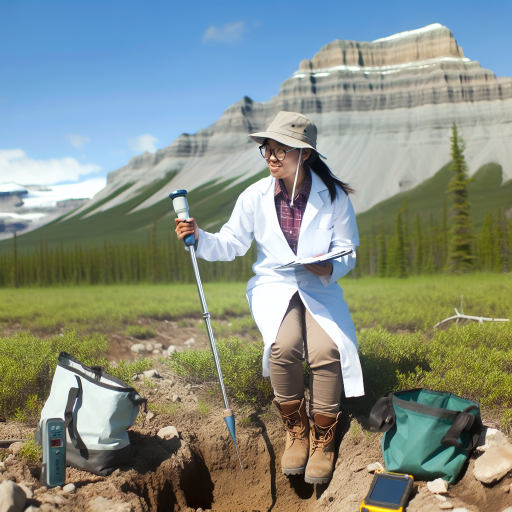Introduction to the Role of Crop Advisors in Sustainable Agriculture
Crop advisors play a vital role in promoting sustainable farming practices.
They provide expert guidance to farmers on various agricultural practices.
This guidance helps in enhancing productivity while minimizing environmental impact.
Moreover, crop advisors facilitate the use of innovative technologies in farming.
They ensure farmers are aware of the latest sustainable practices available.
Assessment of Soil Health
One key responsibility of crop advisors is assessing soil health.
They conduct soil tests to gauge nutrient levels and pH balance.
These tests enable the formulation of effective fertilization strategies.
Additionally, they promote practices that enhance soil organic matter.
Crop Rotation Strategies
Crop advisors recommend crop rotation as a sustainable practice.
This method prevents soil depletion and reduces pest issues.
By varying crops, farmers can improve soil fertility and productivity.
Furthermore, rotation can lead to a decrease in the need for chemical fertilizers.
Integrated Pest Management
Another important area is integrated pest management (IPM).
Crop advisors help farmers adopt IPM techniques to manage pests sustainably.
These techniques involve biological controls and cultural practices.
This approach minimizes chemical pesticide use and enhances ecological health.
Water Conservation Techniques
Crop advisors also focus on water conservation methods in farming.
They guide farmers in implementing efficient irrigation practices.
These practices conserve water and reduce runoff.
Moreover, advisors promote the use of rainwater harvesting systems.
Education and Training
Education is fundamental to the role of crop advisors.
They conduct workshops and training sessions for farmers.
These sessions cover sustainable practices, technology, and market trends.
Furthermore, crop advisors provide ongoing support and resources to farmers.
Unlock Your Career Potential
Visualize a clear path to success with our tailored Career Consulting service. Personalized insights in just 1-3 days.
Get StartedOverall, crop advisors greatly influence sustainable agriculture.
They empower farmers to make informed decisions for a healthier environment.
Understanding Sustainable Farming Practices
Definition and Key Principles
Sustainable farming focuses on meeting current food needs without compromising future generations.
It integrates ecological principles into agricultural practices.
Healthy soil, water conservation, and biodiversity form its core tenets.
This approach prioritizes environmental stewardship and social responsibility.
Importance of Sustainable Farming
Sustainable farming practices are vital as they enhance ecosystem health.
They contribute to increased soil fertility and water retention.
Moreover, these practices help reduce reliance on synthetic fertilizers and pesticides.
This reduction lowers pollution and promotes animal and plant health.
Benefits for Farmers
Farmers adopting sustainable practices often see improved yields over time.
These practices can lead to cost savings through reduced input needs.
Additionally, they enhance resilience to climate change impacts.
Farmers enjoy better marketability for sustainably produced products.
Community and Economic Impact
Sustainable farming strengthens local economies by creating jobs and supporting local markets.
It fosters community engagement and builds agricultural knowledge.
Furthermore, sustainable practices can drive innovation in farming techniques.
This results in a more resilient agricultural sector.
Assessing Soil Health and Fertility Management
Importance of Soil Health
Soyl health is crucial for sustainable agriculture.
It directly impacts crop productivity and ecosystem stability.
Healthy soil supports plant growth and improves yields.
Moreover, it enhances nutrient cycling and retention.
Methods of Assessment
Crop advisors utilize various methods for soil assessment.
One effective approach is soil sampling.
They collect samples from different field sections.
Next, they analyze these samples in a lab.
Field testing is another crucial technique.
This involves on-site evaluations of soil properties.
Advisors check for pH, texture, and organic matter levels.
Soil Testing Parameters
Several key parameters are assessed during soil testing.
- Nutrient levels determine soil fertility.
- Soil pH affects nutrient availability.
- Organic matter content influences soil structure.
Each parameter provides insight into soil health.
Interpreting Results
Interpreting soil test results is critical for effective recommendations.
Advisors compare results against established benchmarks.
They consider local crop needs and environmental conditions.
This analysis helps pinpoint necessary amendments.
Recommending Fertility Management
Based on assessments, advisors recommend specific management practices.
These may include fertilization strategies and crop rotations.
Advisors also advocate for cover cropping and reduced tillage.
Such practices enhance soil health and sustainability.
Monitoring and Follow-Up
Continuous monitoring ensures the effectiveness of management practices.
Advisors schedule follow-up assessments at key growth stages.
This proactive approach allows for timely adjustments.
Ultimately, it supports ongoing soil fertility and crop productivity.
Uncover the Details: Livestock Nutritionist Insights For Sustainable Farming
The Impact of Crop Rotation and Diversity on Ecosystem Health
Enhancing Soil Health
Crop rotation improves soil structure and fertility.
Different crops contribute various nutrients to the soil.
These practices support a diverse microbial community.
Healthy soils promote better water retention and drainage.
As a result, crops become more resilient to diseases.
Encouraging Biodiversity
Diverse cropping systems enhance biodiversity on farms.
More plant species attract a variety of pollinators.
This diversity helps control pest populations naturally.
Increased biodiversity contributes to a balanced ecosystem.
The presence of various organisms improves overall stability.
Reducing Pest and Disease Pressure
Crop rotation disrupts pest and disease life cycles.
Changing crops limits opportunities for pests to thrive.
Farmers can reduce reliance on chemical pesticides.
This fosters a healthier environment for surrounding wildlife.
Consequently, it supports sustainable farming practices.
Improving Resilience to Climate Change
Diverse rotations enhance ecosystem resilience to climate variations.
Different crops adapt to changing climatic conditions.
This flexibility reduces risks associated with crop failure.
Farmers can better manage unpredictable weather patterns.
Ultimately, sustainable practices lead to long-term success.
Delve into the Subject: Advancements in Seed Genetics and Technology Trends
Utilizing Technology and Precision Agriculture in Sustainability Efforts
The Role of Precision Agriculture
Precision agriculture enhances farming efficiency and sustainability.
Farmers utilize advanced technologies to monitor crop health.
They apply targeted treatments to minimize waste and optimize yield.
This technology improves resource management and reduces environmental impact.
Integration of Data Analytics
Data analytics play a crucial role in modern farming practices.
Crop advisors collect data on soil conditions and weather patterns.
They analyze this data to provide tailored advice to farmers.
This process leads to informed decision-making and improved crop management.
Use of Drones and Remote Sensing
Drones offer aerial insights into field conditions.
They monitor plant health and identify areas needing attention.
Remote sensing technology also tracks moisture levels across fields.
These methods help farmers apply resources precisely when needed.
Advancements in Soil Management
Technology has revolutionized soil management techniques.
Farmers use sensors to assess soil nutrients and moisture.
These insights guide the application of fertilizers and irrigation.
As a result, they enhance crop yield while protecting soil health.
Fostering Sustainable Practices
Crop advisors advocate for sustainable farming methods.
They promote cover cropping and crop rotation strategies.
These practices prevent soil erosion and promote biodiversity.
Farmers benefit from healthier soil and reduced pest incidence.
Community Engagement and Education
Education is vital for implementing sustainable practices.
Crop advisors conduct workshops to share best practices with farmers.
They help farmers understand the benefits of sustainability.
Through community engagement, farms thrive while respecting the environment.
The Future of Sustainable Farming
The future lies in continued innovation and adaptation.
Crop advisors remain at the forefront of these advancements.
Their guidance helps shape sustainable agriculture for generations.
Ultimately, technology and education will drive agriculture forward.
Uncover the Details: Arborists and the Preservation of Historic Trees and Forests
Advising Farmers on Pest Management Strategies
Introducing Integrated Pest Management
Integrated Pest Management (IPM) combines various control methods.
Crop advisors promote this approach to reduce chemical use.
Additionally, IPM considers ecological and economic factors.
Understanding Pest Life Cycles
Knowledge of pest life cycles aids in choosing effective controls.
Advisors educate farmers on identifying pest stages.
This education helps farmers time their management strategies effectively.
Encouraging Biological Controls
Biological controls utilize natural enemies of pests.
Crop advisors recommend introducing beneficial insects.
For example, ladybugs control aphid populations effectively.
Utilizing Cultural Practices
Cultural practices can significantly reduce pest pressures.
Farmers can rotate crops to disrupt pest life cycles.
Additionally, maintaining healthy soil boosts plant resilience.
Environmental Monitoring
Ongoing monitoring helps identify pest outbreaks early.
Farmers benefit from using traps and scouting techniques.
Advisors guide farmers on proper monitoring methods.
Implementing Targeted Chemical Use
When necessary, targeted chemical applications minimize harm.
Crop advisors emphasize using the least toxic options first.
Farmers receive training on timing and application methods.
Encouraging Community Collaboration
Working together enhances pest management success.
Advisors encourage farmers to share information and strategies.
Community collaboration leads to a broader impact on pest populations.
Delve into the Subject: Key Responsibilities of a Crop Advisor in Canada

Implementing Conservation Tillage Practices for Soil Preservation
Importance of Conservation Tillage
Conservation tillage plays a vital role in modern agriculture.
This method significantly reduces soil erosion.
Consequently, it helps retain moisture in the soil.
Additionally, it enhances soil structure over time.
Techniques for Conservation Tillage
Farmers can adopt various techniques for effective conservation tillage.
- No-till farming leaves soil undisturbed.
- Reduced tillage minimizes the number of passes over the field.
- Strip tillage creates narrow strips for planting while leaving residue intact.
Each technique offers unique benefits for soil health.
Crop Advisor Support
Crop advisors provide essential guidance for implementing conservation tillage.
They conduct soil assessments to tailor practices for specific fields.
Moreover, advisors offer training programs to educate farmers.
With their help, farmers can optimize tillage practices.
Benefits of Conservation Tillage
Implementing conservation tillage yields multiple benefits.
- It improves soil fertility and crop yield.
- It reduces fuel consumption for farming operations.
- Moreover, it promotes biodiversity in agricultural ecosystems.
Thus, conservation tillage supports both economic and environmental sustainability.
Education and Outreach Programs for Farmers on Sustainable Practices
Importance of Education
Education plays a crucial role in sustainable agriculture.
Farmers need to understand practices that protect the environment.
Additionally, informed farmers make better decisions about resources.
Workshops and Training Sessions
Crop advisors often conduct workshops on sustainable methods.
These sessions cover soil management and pest control techniques.
Furthermore, hands-on training allows farmers to practice new skills.
Online Resources and Webinars
Many advisors offer online resources for accessible education.
Webinars allow farmers to learn from experts in real-time.
These platforms provide flexibility for busy schedules.
Field Days and Demonstrations
Field days showcase sustainable practices in action.
Farmers can see the benefits firsthand during these events.
This experiential learning deepens their understanding.
Collaboration with Agricultural Organizations
Crop advisors partner with organizations promoting sustainable practices.
These collaborations enhance outreach and provide additional resources.
Such partnerships can lead to funding for education initiatives.
Feedback and Adaptation
Gathering feedback from farmers is essential for program improvement.
Advisors adapt their approaches based on farmer experiences.
This ensures that educational content remains relevant and effective.
Successful Partnerships for Sustainable Farming
Case Study: Green Fields Consulting and Maple Farm
Green Fields Consulting partnered with Maple Farm to implement sustainable methods.
They utilized cover cropping to reduce soil erosion and improve health.
This approach increased water retention in the soil significantly.
Consequently, Maple Farm reported a 30% increase in crop yields.
Moreover, soil tests showed enhanced nutrient levels.
Case Study: Eco Ag Advisors and River Valley Growers
Eco Ag Advisors collaborated with River Valley Growers to promote organic practices.
They introduced crop rotation and integrated pest management strategies.
This transition minimized chemical usage, enhancing biodiversity.
As a result, River Valley Growers achieved organic certification within two years.
The partnership set a benchmark for neighboring farms to follow suit.
Case Study: Future Farms and Sunny Fields Agriculture
Future Farms worked with Sunny Fields Agriculture on precision farming techniques.
They employed data analytics to optimize input use and reduce waste.
This strategy lowered costs and improved environmental impact significantly.
Sunny Fields reported a 25% reduction in fertilizer use over three seasons.
Consequently, this led to healthier plants and better yields.
The Role of Education and Training
Crop advisors provide critical education and training for farmers.
They offer workshops on sustainable practices and advanced technology.
Continuous education helps farmers stay informed about new methods.
This knowledge transfer fosters innovation and adaptation in farming.
The Impact of Sustainable Practices
Sustainable farming practices benefit both the environment and farmers.
They enhance soil health and increase resilience against climate change.
Farmers enjoy improved profitability through reduced input costs.
These successful partnerships illustrate the power of collaboration.
Ultimately, they pave the way for a sustainable agricultural future.
Additional Resources
News & Events – Division of Agriculture and Natural Resources
CDFA Accepting Applications for Conservation Agriculture Planning …




